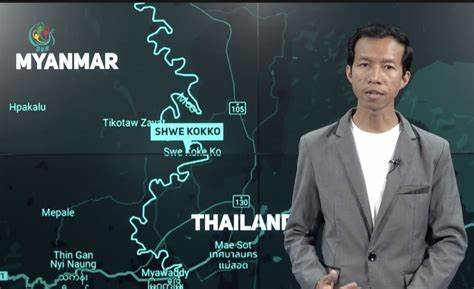Following the alarming abductions of Chinese nationals, including actor Wang Xing, Thailand faces a crisis of confidence among Chinese tourists, who topped the visitor list last year. Thai aviation officials predict a significant drop in arrivals from China after reports that 10,000 tourists canceled flights following the incidents. The Thai government has responded by cutting power to suspected scam centers near the Myanmar borde.
BY PC Bureau
Thailand has announced plans to cut power to certain border areas with Myanmar to combat “scam centres” where human trafficking victims are forced to work in cyber fraud operations. The Thai government unveiled the measure today in response to rising concerns about criminal gangs operating industrial-scale compounds along the Thai-Myanmar border.
According to local media reports, the decision follows the high-profile abduction of Chinese actor Wang Xing in Thailand last month. Xing had reportedly traveled to Thailand for a promised acting opportunity but was instead taken across the border into Myanmar, where authorities believe he was forced to work at a scam call center targeting Chinese nationals.
ALSO READ: How a Hollywood Psychic’s Chilling Prediction Came True
Thai police stated that the criminal networks behind these operations continue to exploit trafficked individuals in Myanmar’s lawless border areas. In January, Chinese model Yang Zeqi and several other victims were rescued from a human-trafficking ring in the region after being deceived by job offers in Thailand.
Impact on Tourism
The abduction cases have sparked safety concerns among Chinese nationals, who represent Thailand’s largest group of international visitors. Thai aviation authorities expect a decline in arrivals from China during the January 24 to February 2 period, despite overall higher traveler numbers.
The Airports of Thailand (AOT) reported around 10,000 flight cancellations by Chinese tourists following the kidnapping reports. In February, a scheduled concert by Hong Kong pop star Eason Chan in Bangkok was canceled due to concerns about the safety of Chinese visitors.
ALSO READ: People could Prefer Messi, but I’m the most complete player: Ronaldo
Prime Minister Paetongtarn Shinawatra acknowledged the impact on tourism and national reputation. “What happened has had a huge impact on many Thai people and the image of the country,” she said, adding that the National Security Council is set to implement power cuts in affected regions as soon as possible.
The Security Council’s chief identified Myanmar’s Tachileik, Myawaddy, and Payathonzu regions as hotspots for transnational crime syndicates and possible targets for power supply cuts.
The National Security Council (NSC) has decided to cut electricity, oil, and internet supplies to five locations near the Thai-Myanmar border.
Defense Minister Phumtham Wechayachai said after the NSC meeting that relevant agencies concluded scam groups in Myanmar pose a national… pic.twitter.com/ubRJUdxJCs
— Thai Enquirer (@ThaiEnquirer) February 4, 2025
In a rare move to reassure Chinese tourists, the Thai government released an AI-generated video of Prime Minister Shinawatra speaking in Mandarin, a language she does not speak, to emphasize that the kingdom remains safe for visitors.
Myanmar’s Response
Myanmar’s State Administration Council (SAC) Chairman, Senior General Min Aung Hlaing, issued a stern warning on Tuesday, stating that strict action would be taken against officials involved in online gambling and cyber fraud operations.
During a meeting on Monday, he emphasized that “effective measures will also be taken against those involved in narcotics and other crimes.”
State-run newspaper The Mirror reported that Myanmar is ramping up cooperation with international governments to combat the growing threat of cyber fraud and human trafficking comprehensively. “Responsible officials at different levels in regions and states are required to prevent and crack down on online gambling, scams, and other crimes resolutely without fail,” the report added.
Thailand’s move to cut electricity to border regions underscores the gravity of the ongoing cyber fraud and trafficking crisis, with both nations vowing to address the issue with immediate and effective measures.














